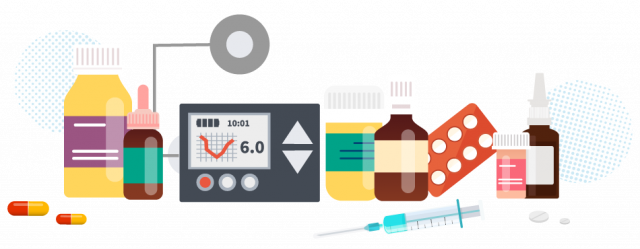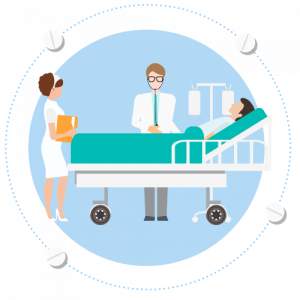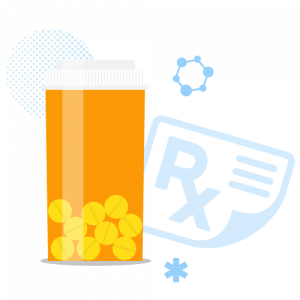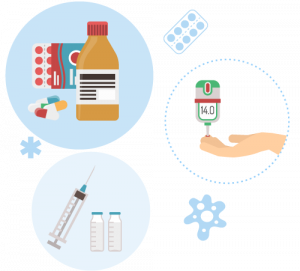Drug Side Effects & Medical Device Complications
Prescription drugs and medical devices can come with unwanted side effects and complications. These serious adverse events can be life-threatening and potentially fatal. Enter the adverse events you are experiencing into the box below to discover possible links to prescription drugs and medical devices.
Popular Searches
- Belviq Side Effects
- Hernia Mesh Complications
- Hip Replacement Complications
- Injectafer Side Effects
- Ozempic Side Effects
- Philips CPAP Side Effects
- Proton Pump Inhibitor (PPI) Side Effects
- Talcum Powder and Mesothelioma
- Talcum Powder & Ovarian Cancer
- Taxotere Side Effects
- Tepezza Side Effects
- Tylenol Side Effects
- Valsartan Side Effects
- Xeljanz Side Effects
Editors carefully fact-check all Drugwatch.com content for accuracy and quality.
Drugwatch.com has a stringent fact-checking process. It starts with our strict sourcing guidelines.
We only gather information from credible sources. This includes peer-reviewed medical journals, reputable media outlets, government reports, court records and interviews with qualified experts.
Even though the U.S. Food and Drug Administration may approve a drug or medical device for use, it may still cause side effects or complications for some patients. Manufacturers, regulators and health care professionals have to weigh the benefits of a drug or device against its risks. Sometimes this means comparing risks to benefits for the general population. Other times it may mean comparing risks to benefits for an individual patient.

What are Severe Drug Side Effects?
Severe side effects from drugs can range from infections to death.
If a drug has numerous reports of a particular problem, the U.S. Food and Drug Administration can add warnings to the drug’s label, including its stringent black box warning. In rare cases, the drug is recalled or removed from the market.
The FDA refers to side effects or other problematic consequences of drugs and medical devices as “adverse events.” Under federal regulations, adverse events include any unexpected or unfavorable medical occurrence whether it is related to the drug or not.
- Death
- A life-threatening condition
- Hospitalization
- Disability
- Congenital anomaly – any affect from prior to conception through pregnancy that may have an adverse outcome on the fetus or child
- Intervention required to prevent permanent impairment or damage
Tracking Adverse Events

From 2011 to mid-2017, the FDA received more than 5.4 million reports of prescription drug adverse events, including more than 1 million deaths. The agency keeps these reports in its FDA Adverse Events Reporting System (FAERS) database. Consumers can search for side effects of specific drugs reported to the FDA at the agency’s Public Dashboard.
Regulators can use this data to look for “signals,” indications there may be a potential safety issue with a particular drug. These may occur when there is a spike in the number of reports of a particular side effect.
These reports, along with scientific studies, can help determine if regulators should issue warnings of serious side effects to the public and health care professionals or require drug makers add warnings to their drug labels.
| Drug | Cancer | Death | Eye Damage | Heart Issues | Infection | Kidney Damage | Liver Damage | Pancreatitis | Stroke | Suicide | Birth Defects |
|---|---|---|---|---|---|---|---|---|---|---|---|
| Abilify | X | X | X | ||||||||
| Elmiron | X | X | |||||||||
| Fluoroquinolones | X | X | X | ||||||||
| Onglyza | X | X | |||||||||
| PPIs | X | X | X | X | |||||||
| Risperdal (Invega) | X | ||||||||||
| SGLT2 Inhibitors | X | X | |||||||||
| SSRIs | X | X | |||||||||
| Taxotere | X | ||||||||||
| Testosterone | X | X | X | ||||||||
| Valsartan | X | X | X | ||||||||
| Xarelto | X | ||||||||||
| Zantac | X | X | X | ||||||||
| Provigil or Nuvigil | X | X | X |
Severe Medical Device Complications
Complications of medical devices include risks from surgery, infection and device failure. All surgeries include some level of risk. These may be minor bruising or more serious, such as a reaction to anesthesia.
The risk of infection is common to all surgeries, and can be a serious complication of medical devices. Treating an infection may be as simple as taking antibiotics or as complex as a second surgery to remove and replace a device.
- Death
- Device breakage or failure
- Device migration
- Infection
- Organ damage
- Perforation
- Revision surgery
Medical Device Complication Discovery
The FDA defines medical devices as just about any device used in the diagnosis, treatment, prevention or cure of a medical condition. These can include surgical instruments or devices left temporarily or permanently in the human body such as hip and knee implants, surgical mesh, and pacemakers.
Many of these devices gain approval through the FDA’s 510(k) clearance process. This allows companies to market a new device if they can show it is “substantially similar” to other products already on the market.
Some high-risk devices do require advanced safety studies, but federal regulations allow for smaller and less rigorous trials than what is required for prescription drugs.
Some medical devices have been found to have serious complications specific to the device. These may be due to a design flaw or a manufacturing defect.
| Device | Death | Device Failure | Migration | Infection | Organ Damage | Perforation | Surgery | Cancer | Coma |
|---|---|---|---|---|---|---|---|---|---|
| Bair Hugger Blankets | X | ||||||||
| Essure | X | X | X | ||||||
| Heater-Cooler Devices | X | ||||||||
| Hernia Mesh | X | X | X | X | |||||
| Hip Implants | X | X | X | ||||||
| IV Flush Syringes | X | X | |||||||
| IVC Filters | X | X | X | X | X | X | |||
| Knee Implants | X | X | X | ||||||
| Duodenoscopes | X | ||||||||
| Transvaginal Mesh | X | X | X | X | X | X | |||
| Allergan Breast Implants | X | X | X | X | |||||
| BD Alaris Systems Pumps | X | X | |||||||
| Surgical Staplers | X | X | X | X |
Minor Side Effects and Complications

Prescription drugs and medical devices may also have minor side effects and complications.
Possibly the most common side effects of any prescription drug are gastrointestinal issues, including nausea, constipation and diarrhea, because most drugs go through the digestive system to be absorbed. Other common effects include drowsiness, pain and skin reactions. Minor complications from medical devices could include varying levels of pain.
- Diarrhea
- Dizziness
- Drowsiness
- Fatigue
- Heart issues (palpitations, irregular heartbeats)
- Hives
- Nausea and vomiting
- Rash
- Stomach upset
| Drug Type | Common Side Effects |
|---|---|
| Antibiotics | Nausea, diarrhea, rash, yeast infection, fever |
| Antidepressants | Weight gain, insomnia, nervousness |
| Antihistamines, allergy medications | Drowsiness, insomnia, weakness |
| Asthma medications | Nervousness, sweating, nausea, vomiting |
| Decongestants | Nose bleed, nasal irritation |
| Diabetes medications | Nausea, heartburn, fatigue, dizziness |
| Heart and blood pressure medications | Dizziness, drowsiness, chest pain, loss of appetite, leg pain |
| Heartburn medications | Constipation, bloating |
| Pain relievers | Stomach upset, tinnitus, nausea |
Common Minor Side Effects of Medical Devices
Minor side effects are generally defined as those that may be uncomfortable for the patient, but does not threaten the person’s health or is so uncomfortable the device has to be removed or repaired.
Most minor side effects or complications involving medical devices happen through surgery. This may involve a tool used during an operation or a device implanted into the body.
- Bruising around the surgical site
- Mild allergic or other reaction
- Minor infection
- Numbness
- Pain
- Redness
- Swelling
Most minor complications can be treated with medication. If these conditions persist or worsen, they may be a sign of a more serious problem and you should talk to a doctor immediately.
Serious Side Effects of Consumer Products
In addition to drugs and medical devices, some consumer products may cause health problems. Some of these are serious and may lead to death. Two of these products are talcum powder and e-cigarettes such as Juul.
Side Effects of Talcum Powder
Talcum powder is a fine, silky powder manufacturers use in consumer products such as baby powder, makeup and paint. In the late 1800s, Johnson & Johnson released its iconic Johnson’s Baby Powder with talc.
The American Academy of Pediatrics recommends against the use of talcum powder on infants because inhalation of talc can cause talc pneumoconiosis, an inflammatory lung condition that may be fatal in infants.
Talc can also cause health problems in adults. One of the issues with talc is that it can be contaminated with asbestos, a known carcinogen that causes an aggressive cancer called mesothelioma. In addition, since the 1970s, a handful of studies have connected genital use of talcum powder with ovarian cancer.
The World Health Organization has listed genital use of talcum powder as “possibly carcinogenic to humans” and talc that contains asbestos as “carcinogenic to humans.”
Side Effects of E-Cigarettes
Experts agree that Juul and other e-cigarettes are less harmful than traditional cigarettes, but vaping isn’t safe. Common side effects of vaping include dry mouth, dry eyes, coughing, addiction and nausea.
Serious potential e-cigarette side effects include lung problems such as e-cigarette or vaping product use-associated lung injury (EVALI), bronchiolitis obliterans organizing pneumonia (BOOP) and bronchiolitis obliterans (popcorn lung). These conditions may lead to hospitalization and in some cases, death.
Other serious potential side effects include seizures, nicotine poisoning, stroke and heart problems.
High-Risk Conditions
People who have serious health conditions such as heart disease, cancer or diabetes frequently have other medical conditions as well. The medications they take for these other conditions may present serious side effects or complications that make their conditions worse. Medical devices they rely on may also affect their risk of complications or affect their treatment.

Diabetes
Diabetes is a group of conditions in which the body is not able to produce or respond to a critical hormone called insulin. People who develop diabetes have too much sugar in their blood. Your risk for developing diabetes can include family history, excess weight, lack of exercise and improper diet.
People diagnosed with diabetes may take medicines for other conditions such as allergies or high blood pressure. But some of those medications or conditions may worsen their diabetes or affect their medical devices for treating the disease.
- Antipsychotic drugs
- Beta-blockers (high blood pressure, glaucoma drugs)
- Glucocorticoids (steroids)
- Niacin (cholesterol medication)
- Thiazide diuretics (blood pressure drugs)
Heart Disease and Stroke
Heart disease includes both heart attacks and heart failure. Both are usually the result of coronary artery disease, a condition where fat and other materials can build up in arteries, making them harder and narrower.
- NSAIDS (pain relievers)
- Decongestants, allergy and cold medications
- Weight-loss drugs
The American Heart Association lists more than 100 different drugs that pose a risk to people with heart disease. Many of these drugs can also interfere with treatment after a stroke.
People with heart disease take an average of seven drugs every day just to treat that one condition. This can also increase the risk of a dangerous drug interaction with other medicines they may take. Heart and stroke patients should make sure every doctor they visit is aware of all the medications they are taking and never take drugs without first checking with their doctor.
Cancer
Cancer is a condition in which abnormal cells in the body start dividing out-of-control and invade nearby organs or other tissue. It can spread throughout the body through the bloodstream or through a person’s lymph nodes — small glands throughout the body.
Medications cancer patients take for other conditions — from heartburn to depression — can change the way the body absorbs to cancer drugs. This effect may weaken cancer drugs or make them more toxic.
- Anticonvulsants
- drugs that stop seizures or treat epilepsy
- Antidepressants
- including SSRIs such as Paxil (paroxetine) and Prozac (fluoxetine)
- Antifungal drugs
- Calcium channel blockers
- used to treat hypertension, high blood pressure
- HIV therapy drugs
- Proton pump inhibitors
- heartburn drugs including Prilosec (omeprazole), Nexium (esomeprazole) and Prevacid
- Certain antibiotics
- fluoroquinolones such as Cipro (ciprofloxacin)
- Statins
- cholesterol medicines such as Crestor (rosuvastatin) and Lipitor (atorvastatin)
- Steroids
- including testosterone replacement therapy such as AndroGel
Calling this number connects you with a Drugwatch.com representative. We will direct you to one of our trusted legal partners for a free case review.
Drugwatch.com's trusted legal partners support the organization's mission to keep people safe from dangerous drugs and medical devices. For more information, visit our partners page.


